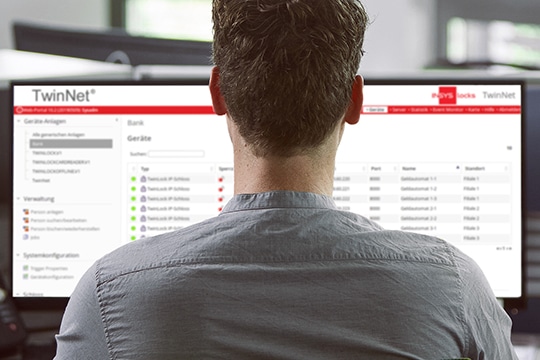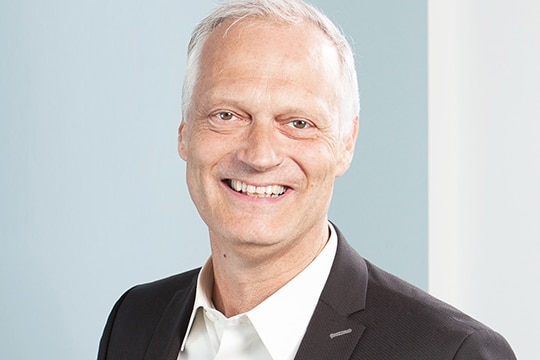13 years in technology and development, 15 years in sales: Detlef Lücke has in-depth insight into the world of high security solutions. Nevertheless, the head of INSYS locks is never tired of finding new approaches. We talked to the mechanical engineer about developments in the financial world, challenges for lock manufacturers and innovations on the market.
Mr. Lücke, you have been working in the security industry for almost 30 years. What does security mean to you personally?
Good question. I would say that security for me in my private life means fundamental protection against external intervention. Ideally, security is something you hardly notice. It accompanies you in the most important things, adapts to your situation in life, but is not intrusive. When I enter my home I don’t want to have to open a safe door and enter a PIN code. Security systems have to be ergonomic – and of course secure
And what does security mean to you in a professional context?
The basic approach is of course the same: security should not be an obstacle for customers, but should offer them the best possible protection. Solutions such as those we develop at INSYS locks fit perfectly into the processes of the customer. The key word is “convenience” – as much convenience as possible. I find it extremely exciting to develop such solutions for customer processes. They present many challenges but also opportunities.
What are the biggest challenges here?
First you have to understand the customer process – there is hardly any process that is exactly the same in different companies. If the connections are clear, it usually becomes apparent that different interfaces come together. Often it is not an internal solution, but a network of processes and cooperation with several internal and external service providers. The challenge then lies in integrating yourself as seamlessly as possible into this entire chain of interfaces of responsibilities, software and hardware.
How do you deal with these challenges?
I think we at INSYS locks are particularly well positioned in this respect for various reasons. We are not a large corporation, but as a medium-sized company we have a compact team in which everyone understands their individual assignment very well. All our staff – from technology to laboratory to sales – are in direct contact with our customers. We all regard ourselves as service providers who find answers to requirements and are involved right from the start. The team is therefore an important factor. This also results in another strength: the composition of our team makes us fast and flexible. Short consultation distances and dynamic processes enable us to react ideally to customer requirements.
And last but not least: after many years in the industry, we have acquired very good technical and software know-how at all levels. My team learns from every order, has a high level of manufacturing and process knowledge and can comprehensively illuminate new challenges in finding solutions.
Your customers are to a large extent in the banking and financial world. In your opinion, is the topic of security practised to the necessary extent there?
Undoubtedly, the financial world has not yet done everything in its power to protect itself against robberies, tampering or fraud. The problem, in my view, is that banks in particular want to outsource too many responsibilities. They transfer many security-relevant processes to external service providers. I think this is a mistake, because certain functions – from security codes to access keys to emergency plans – belong in the hands of the banks. And there is a very important reason for this: if something should go wrong – after all, mistakes are human – the bank is legally protected, but for the customers who may be affected, the service provider is not to blame. At the end of the day, it is the bank that has the image problem.
Banks are now having more frequent problems with their image. It is increasingly said that banking in Germany needs to change radically. So is the trend going in the wrong direction?
You can’t say that in general. Taking more steps into the digital world, for example, is a good approach. This creates more flexibility. But – to follow on from my previous point – banks were originally trusted for their security. Banks used to be places of the utmost trust. And they are giving up this secure image by surrendering a great deal of their responsibilities. And by that I mean not only processes, but also services. I can now get loans elsewhere, too. The same applies to bonds, securities and so on. Banks often think only digitally and leave customers to their own devices in many respects. Branches are being closed, the customer is supposed to do everything online and not come by in person anymore. But what remains then?
I think that banks should continue to position themselves in their role as places of trust. They have to maintain branches, take care of physical values such as cash or valuables and also offer a complete package. For example, if I want a loan, a bank could take care of everything – from the notary to the appraiser. I regard the bank of the future as a reliable service provider that strives to provide me with an integrated service.
You could now be provocatively accused of saying that in the interests of your own business. Fewer branches mean fewer vaults or ATMs where your locks and security systems are installed. How do you feel about that?
You could almost get that impression. (laughs) But no, I’m not making these statements because of the business, but because I evaluate the situation on the basis of my professional experience. Because you know what? If the banks no longer keep the business relating to valuables or cash in-house, others will simply step in, who then also depend on our security solutions. At 75%, the demand for cash in Germany is still very high. Business will therefore only shift to the non-banking sector. Then I’ll pick up my cash at the discount store, at the town hall, at the cinema or at the filling station. Others will simply take the place of the banks and there will also be further automated solutions such as ATMs – ideally with locks from INSYS locks.

Your industry expertise is probably also drawn from your network. For example, you are involved in standardisation at the European level. What’s that all about?
I am a member of the so-called ‘WG3’, i.e. Working Group 3, which deals with high-security locks at the European level.
In this working group, which is controlled by the ECB, representatives of testing institutes, insurance companies and other manufacturers from all over Europe are represented in addition to myself. There are also technical experts and consultants involved. Together we develop generally applicable standards for high-security locks for Europe.
Sounds exciting. What is your current focus here?
We are currently working on a new standard, the so-called EN1300. This is specifically about „distributed systems“. These are locking systems that can be accessed and controlled from a network. A network can be a public network, a classic IP network or an intranet.
But how can I avoid attacks from outside if lock systems can be accessed from a network? What encryptions, protocols, firewalls, etc. have to be in place? In the WG3 we develop unequivocal security standards in order to guarantee uniform certification throughout Europe. It is expected that the standard will officially come into force next year.
Sounds like a big challenge!
It is – but it’s also very rewarding. We need to join the ongoing digitalisation process. The advantages of distributed systems cannot be denied. But in the end, the corresponding security guidelines also have to be defined.
What advantages do these distributed systems have especially for your customers?
The general advantages are easy to name: on the one hand, of course, security increases. The risks of external interference are minimised if appropriately tested guidelines are adhered to. On the other hand, personnel costs are reduced if you no longer have to be on site to adjust the lock.
At INSYS locks, we have long been preparing for the new standard. This means that we are developing new functions for our existing locking systems that reduce manual effort and also provide more features that comply with current security standards. Of course, we keep in mind that our network systems are already in use at a high level, and are working to ensure that our customers will be equally well protected with simple updates or upgrades.
This interview was also published in German in two professional journals. Find the original articles here:
gi Geldinstitute – Issue 5, 2019 (publication date: 18.10.2019)
IT-BANKER – Issue 5, 2019 (publication date: 30.10.2019)

